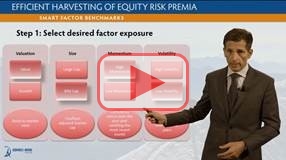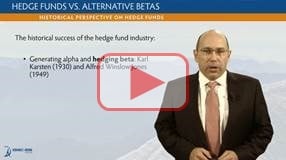|
March, 2018
|
|
|
|
Factor Investing across Asset Classes
Risk factors, defined as systematic underlying sources of risk that impact a large set of securities, have long been used in investment practice for analysing risk and performance of actively or passively managed portfolios. More recently, a new approach has emerged, where factors have a more explicit role in the investment process. This approach, known as factor investing, recommends that allocation decisions be directly expressed in terms of risk factors, as opposed to standard asset class decompositions. More...
|
Table of Contents
|
Smart Beta and Beyond: Maximising the Benefits of Factor Investing, by Lionel Martellini and Vincent Milhau
Factor investing is an investment paradigm under which an investor decides how much to allocate to various factors, as opposed to various securities or asset classes. Its popularity has been growing since the turn of the millennium, especially after the recognition in 2008 that multiple asset classes can experience severe losses at the same time despite their apparent differences. The term "factor", however, is used with many different meanings depending on the context and the targeted application. The main goal of this paper, supported by Amundi ETF, Indexing and Smart Beta, is to provide clarification with respect to the various possible definitions of factors that are relevant in investment practice. More...
|
|
|

|
"Discussion of Smart Beta and Factor Investing" - an Interview with Laurent Trottier
In this month's interview, Laurent Trottier, Global Head of ETF, Indexing & Smart Beta Management, Amundi, comments on the growth of Factor Investing in an institutional context. He tells us about the demand for Smart Beta strategies in equity and also bond markets, and shares his views on the main challenges for asset managers involved in Smart Beta and Factor Investing. More...
|
|

|
|
IPE: Goal-Based Investing and its Application to the Retirement Problem
Financing consumption in retirement has arguably become the greatest challenge for most individuals following a number of important changes, including the weakening state pension systems and the shift from defined-benefit to defined-contribution schemes in the corporate world that has left individuals more exposed to retirement risks. More...
IMR: Multi-Asset Products and Solutions
Within the old paradigm, the asset management industry had long focused on the design of products with attractive performance, in a context where the distinction between active management with high fees and the passive replication of a benchmark at more moderate fees was a structuring frontier. At least since the turn of the millennium, profound changes have been taking place, which have led to the value proposal for investment management being entirely rethought. More...
IMR: Retirement Goal-Based Investing
With the need to supplement retirement savings via voluntary contributions, individuals will increasingly be responsible for their own saving and investment decisions. This global trend poses substantial challenges as individual investors not only suffer from behavioural limitations, but also typically lack the expertise needed to make educated investment decisions. More...
New EDHEC Survey on Equity Factor Investing Calls Risk Techniques into Question
In a new survey conducted among investment professionals between June and September 2017, EDHEC-Risk Institute and ERI Scientific Beta have analysed the interests and motivations for investing in new forms of equity factor strategies. In one of the more striking findings in the survey, there is a contradiction between score-based factor design choices and the statistical beta-based risk analysis. More...
|
|
|
|
|
A Portfolio Perspective on the Multitude of Firm Characteristics, with Raman Uppal
Hundreds of variables have been proposed to predict the cross-section of stock returns; see, for instance, Harvey, Liu, and Zhu (2015), McLean and Pontiff (2016), and Hou, Xue, and Zhang (2017). This large number of cross-sectional predictors leads Cochrane (2011) to ask, "Which characteristics really provide independent information about average returns? Which are subsumed by others?". Cochrane challenges researchers to characterise the dimension of the cross-section of stock returns by identifying a small set of characteristics that subsume the rest. More...
|
|
|
Proverbial Baskets Are Uncorrelated Risk Factors! A Factor-Based Framework for Measuring and Managing Diversification in Multi-Asset Investment Solutions with Lionel Martellini and Vincent Milhau
Multi-asset investment solutions have become increasingly popular amongst sophisticated institutional investors focusing on efficient harvesting of risk premia across and within asset classes. One key challenge in the construction of diversified multi-asset portfolio strategies is that even a seemingly well-balanced allocation to many asset classes can eventually translate into a portfolio with a very concentrated set of underlying risk exposures. The authors suggest to use a factor-based framework for more effectively measuring and managing diversification in multi-asset portfolios. More...
|
|
|
Factor-Based Commodity Investing, with Nikolaos Tessaromatis
A multi-factor commodity portfolio combining the high momentum, low basis and high basis-momentum commodity factor portfolios outperforms significantly, economically and statistically, widely used commodity benchmarks. We find evidence that a variance timing strategy applied to commodity factor portfolios improves the return to risk trade-off of unmanaged commodity portfolios. In contrast, dynamic commodities strategies based on commodity return prediction models provide little value added once variance timing has been applied to commodity portfolios. More...
|
|
|
Inferring Petroleum-Complex Fundamentals, with Hilary Till
This paper will discuss inferring crude-oil-market fundamentals through price-relationship data, largely through the perspective of a commodity futures trader. In doing so, the paper will briefly cover (1) the promise of big data; (2) the reality of data "black holes"; (3) the wealth of futures price data; (4) what futures prices potentially reveal about petroleum-complex fundamentals; and (5) caveats on the use of price data. More...
|
|
|
A Financially Motivated Extension of the Heston Model for a Joint P- and Q-Dynamics Analysis of Variance, with Riccardo Rebonato
The purpose of this article is the formulation of a model for FX rates that can straddle the P and Q measures, and that can be used for a number of applications, such as the estimation of the market price of FX volatility risk, the extraction of P-measure expectations about the volatility of the FX rate, the valuation of variance swaps, and derivatives pricing in general. More...
|
|
|
The Quickest Way to Lose the Money You Cannot Afford to Lose: Reverse Stress Testing with Maximum Entropy, with Riccardo Rebonato
We extend a technique devised by Saroka and Rebonato to optimally deform a yield curve in order to deal with a common and practically relevant class of optimisation problems subject to linear constraints. In particular, we show how the idea can be applied to the case of reverse stress testing, and we present a case study to illustrate how it works. Finally, we point out a maximum-entropy interpretation of (or justification for) the procedure and present some obvious generalisations. More...
|
|
|
"Efficient Harvesting of Risk Premia in Equity Markets" - with Professor Lionel Martellini. This video states the limits and benefits of alternative weighting schemes. This analysis aims to find a better way to construct "smart" benchmarks, and eventually, smart factor benchmarks.
|
"Hedge Funds vs Alternative Betas" - with Professor François-Serge Lhabitant. Today, there are lots of betas, some have specificities, all are systematic and replicable. But before replacing hedge funds with alternative betas, one should be able to answer the questions outlined in this video.
|

|

|
|
Learn more in video by subscribing to our YouTube channel.
|
|
|
|
|
Multi-Asset Investment Products and Solutions Seminar, July 2018
The aim of this seminar is to equip participants with practical tools to improve asset allocation and risk management decision processes, and to implement novel investment management approaches. Emphasis will be put on real world examples of application and the development of problem solving skills using Excel-based portfolio simulation tools. More...
|
|
|
The EDHEC European ETF and Smart Beta Survey 2018, 11th edition
Since 2006, the EDHEC-Risk European ETF and Smart Beta Survey has witnessed the evolution of European investors’ ETF practices and continued to provide insight into the latest trends. The rising demand for ETFs and Smart Beta in bond markets is a recent trend examined in this 11th edition. Participation is expected from top European asset owners and asset managers. More...
|
|
|
Financial Risk Management as a Source of Performance: a series of webinars with the Association Française de la Gestion Financière (AFG), to be launched in April 2018
The first two webinars will host research experts from Natixis AM, on Bond Portfolio Optimisation, and CPR AM on Smart Factor Investing and Efficient Harvesting of Risk Premia in Equity Markets. More...
|
|
|
Launch of the EDHEC - Princeton Goal-Based Investing Index Series
In a forthcoming publication entitled "Applying Goal-Based Investing Principles to the Retirement Problem", EDHEC-Risk Institute and the ORFE department at Princeton University outline the shortcomings of existing retirement products, and lay the academic foundations for a new generation of risk-controlled target date funds. The research efforts to develop more meaningful retirement solutions led to the design of a Goal-Based Investing index series, to be launched early Q2 2018. More...
|
|

|
|
EDHEC-Risk Institute has been cited widely in the business and industry press. A selection of articles may be found below.
"Amundi ETF - Best Fixed Income (all excluding cash) ETF Management Firm & Best Emerging Markets Equity ETF Management Firm", ETF Express (14/03/2018) More... "USS strike: global pensions crisis is now shaking ivory towers", Times Higher Education (26/02/2018) More... "Investors should take into account risk factors", Money Management (04/02/2018) More... "Unsophisticated Techniques of Equity Factor Investing Still Prevail", AllAboutAlpha (01/02/2018) More... "Bottom-Up Gets Two Thumbs Down", Top1000funds (01/02/2018) More... "Does Capitalism Lead to Fraud?", Advisor Perspectives (29/01/2018) More... "Equity factor investing undergoes further examination", Financial Standard (29/01/2018) More... "Equity factor investing calls risk techniques into question", Money Management (23/01/2018) More... "UPDATE: The surprising reason it might be OK to give in to greed and fear", Morningstar (02/12/2017) More... "Alternative beta: Rational enthusiasm", IPE (27/11/2017) More...
|
|
About EDHEC-Risk Institute:
Established in 2001, EDHEC-Risk Institute has become the premier academic centre for industry-relevant financial research. In partnership with large financial institutions, its team of close to 30 permanent professors, engineers, and support staff, and 39 research associates and affiliate professors, implements 7 research programmes and 6 research chairs, industrial partnerships and private research projects focusing on asset allocation and risk management and has developed an ambitious portfolio of research and educational initiatives in the domain of investment solutions for institutional and individual investors.
EDHEC-Risk Institute
393 Promenade des Anglais, BP 3116,
06202 Nice Cedex 3, France
E-mail: [email protected]
Telephone: +33 493 187 887
Web: risk.edhec.edu
|
Subscription Options:
You have received this e-mail as a financial professional listed in our
database, or because you have agreed to receive communications from us.
* If you no longer wish to receive information from EDHEC-Risk Institute, please reply here.
* If you wish to update your contact details, please reply here, providing the necessary information.
To ensure that you continue
to receive e-mails from EDHEC-Risk Institute, please add our organisation to your "Safe Senders" list.
|
|